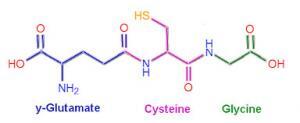
Glutathione, known as “the master antioxidant,” is all the rage these days. TV doctors and health gurus are waxing poetic about it, healthfood stores are selling umpteen facsimiles of it — despite the fact that it’s nothing new! Our bodies have been naturally producing glutathione to protect against oxidative stress since homo sapiens arrived on the earth. It’s good that people are becoming acquainted with this powerful tripeptide, but the thing is: why buy it when you can make it!
Food is the most efficient and cost effective way to supply glutathione to every cell of your body throughout your lifespan. Because production of this antioxidant naturally decreases with age — lack of coenzymes, certain diseases (e.g., cancer, AIDS, Type 2 Diabetes, hepatitis, Parkinson’s), poor diet, pollution, toxins, medications, stress, trauma, UV radiation supply — it’s important to eat a wide variety of quality whole foods to maintain support for every cell and bodily tissue. Glutathione powerfully protects against oxidative damage by scavenging a range of free radicals that can cause cell mutations and increase susceptibility to cancer. It will also help to maximize the effectiveness of other antioxidants, including vitamin C, vitamin E, coenzyme Q10 and alpha-lipoic acid (ALA).
Supplements are not the same as real food which our bodies have been designed for. Commercial forms of glutathione are generally not well absorbed: they get broken down in the intestines, and, thus, don’t enter cells intact. One type of supplement, liposomal glutathione, is claimed to be formulated for optimum absorption, but it’s expensive. Glutathione supplements can also cause side effects, like abdominal cramps, bloating, flatulence and loose stools, allergic reactions, like rash and itchiness. They are especially not recommended for pregnant or breastfeeding women.
The Best Foods For Glutathione Production
Glutathione occurs naturally in the following foods: raw asparagus, almonds, spinach, broccoli, walnuts, garlic, tomatoes, cucumber, watercress and chives. However, the molecule may be reduced or less well absorbed in these depending on the methods used for cooking, storage and farming.
But there are many foods which contain rich amounts of precursors to glutathione, which enable the body to synthesize glutathione. These include foods rich in sulfur-containing amino acids, selenium or alpha-lipoic acid (ALA). Here are some prime examples:
Whey protein, ideally liquid raw whey, rather than processed powders. There are some cold-pressed powders from grass fed cows, free of chemicals, hormones, and other additives.
- Allium vegetables — garlic, onions, leeks, chives
- Cruciferous vegetables — cauliflower, kale, cabbage, broccoli, Brussel sprouts
- Grass-fed meat and pastured eggs
- Natural Vitamin C (not synthetic ascorbic acid) — strawberries, citrus fruits, kiwi,
- papaya, bell pepper
- Milk Thistle — a liver tonic herbal supplement containing silymarin which increases
- glutathione levels
- Wild-caught seafood
- Organ meats
- Turmeric extract — shown to increase glutathione levels
A healthy lifestyle is always recommended — regular moderate exercise, stress management, adequate sleep, elimination of sugar, processed foods, avoidance of excessive alcohol intake, etc.
The Many, Many Benefits of Glutathione
- Fight oxidative stress. Maintaining normal glutathione levels can help protect against oxidative harm which may lead to health conditions like diabetes, cancer, rheumatoid arthritis, etc.
- Reduce chronic inflammation. Glutathione is believed to normalize the body’s immune function, which means sometimes boosting immunity, or in the case of autoimmunity, inhibiting the response.
- Protect against aging issues. It has a positive effect on muscle and vascular health, bone density, cognitive function.
- Slow or ameliorate the progression of Parkinson’s and Alzheimer’s disease. These diseases are linked to oxidative stress and low glutathione levels.
- Fight infections. Studies show glutathione can help against microbial, viral and parasitic infections, also improving the functioning of immune cells and immunity in general.
- Management of autism. Studies show that children on the autism spectrum have lower levels of glutathione, exposing them to great risk of neurological damage induced by oxidative stress.
- Reduce impact of uncontrolled Type 2 diabetes. Uncontrolled hyperglycemia is associated with low glutathione levels, which can cause higher oxidative stress and tissue damage.
- Enhance heart health. Research has found that increased glutathione levels can reduce heart attack risk and other cardiovascular diseases by protecting against oxidative stress.
- Improve skin health. Some forms of glutathione can help reduce the appearance of wrinkles and improve skin elasticity.
- Improve mobility of people with peripheral artery disease. Glutathione can help circulation in leg arteries and increase pain-free walking distance (PFWD) of these patients.
- Treat psoriasis. Psoriasis vulgaris is categorized as an autoimmune disease linked to higher amounts of oxidative stress and systemic inflammation. Studies have found that increasing glutathione levels by eating quality whey protein can help treatment.s
- Help prevent anemia in patients with chronic kidney failure. Glutathione may contribute to increased levels of red blood cells in patients with renal disease and undergoing hemodialysis.
- Help prevent anemia in patients with chronic kidney failure. Glutathione may contribute to increased levels of red blood cells in patients with renal disease and undergoing hemodialysis.
Sources:
Video: Glutathione: The “mother” of all antioxidants — Mark Hymen, M.D.
What is Glutathione and Why Do We Need It? — The Truth About Cancer
10 Natural Ways to Increase Your Glutathione Levels — Healthline
Glutathione: The “Master Antioxidant” that Your Body Needs — Dr Mercola
Health Perspectives




